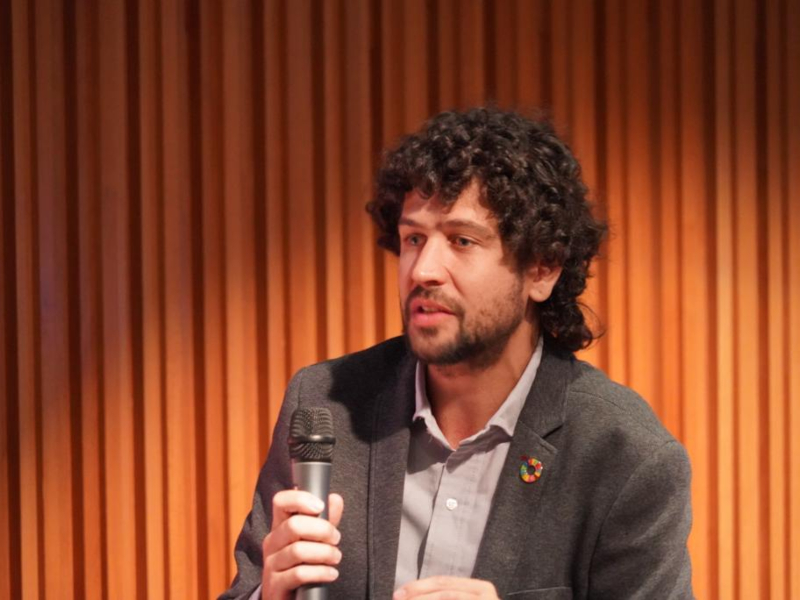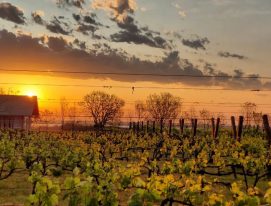Andrés Valero has an active role in many of the different initiatives being implemented by the Grupo Avinea, a member of Alejandro Bulgheroni Family Vineyards (through the brands Otronia, Argento, Pacheco Pereda, Cuesta del Madero and Cruz de Piedra), including the program MatrizViva, active participation in the Argentine Global Pact Network, on the Sustainability Commission at Bodegas de Argentina, and at the Sustainable Wine Roundtable, where he is a member of the board that decides on the group’s policies.
The Green Personality of the Year award handed out to Andrés Valero by the prestigious British publication The Drinks Business is part of an annual awards ceremony that recognizes brands and people who put the green agenda at the center of their business strategy and apply it as far as possible.
Andrés Valero: deserved recognition

The Green Personality of the Year award is given to someone who has stood out in recent years, and especially the previous 12 months (2023 in this case) promoting environmental causes in the industry and the company where they work, in addition to demonstrating their overall commitment to the environment and improving the impact of their company and industry.
“It’s very exciting to receive this international award for the work we’ve been doing. I’ve been with them for the past three years, but for the last decade the Grupo Avinea has been focused on organic, sustainable production. The good thing about this award, given by a British magazine, is that it went to someone from Latin America, an Argentine, but was also given for the Grupo Avinea’s holistic vision, which in addition to intensive work internally on its sustainable and organic production program, is seeking to take the lead in sustainable viticulture,” says Valero.
He adds that he shares the company’s philosophy, not only with regard to certifications but also the underlying sustainability commitment that will support whatever certification the market might demand. The philosophy is that certification should be the result of sustainable practices, not just a label.
Interview with Andrés Valero
What’s the message you want to send to producers?
That everyone, whatever their situation, can orient their business towards taking sustainability into account, it’s what your publics and stakeholders want to be talking about. It can be difficult to identify all your stakeholders, to be aware of the full spectrum of sustainability, and to choose your priorities and how to influence change. We have a clear role in grape production.
All our output is organic, fair trade and certified under the Bodegas de Argentina sustainability protocol, and the model is applied across the company. We’re also beginning to address wider issues such as labor rights, gender policies, and climate change. Maybe not everyone can do all these things all at once but I think that everyone, from small producers to suppliers of similar products, needs to make a contribution, and be aware of what is going on.
To give you a concrete example, we have an excellent waste management program, almost 95% of the waste we generate is put to use, all organic materials are either composted at the vineyard or go to third parties who use it to make something.
Everything that is paper, cardboard and glass is recycled. But we’re always thinking about how to go further: we saw that Mendoza has an ecosystem of organized urban collectors and so we approached them. Good waste management can have a social impact. It’s important to knock on doors and generate strategic alliances in different areas, applying expertise from each.
Andrés notes that Argentina’s climate favors organic production. However, he emphasizes that it needs consistency in the medium term, which isn’t always possible for every company.
Where do you think Argentina is in terms of sustainability and how do you think we’re seen from the outside?
Argentina has done good work in the field of sustainable production. I think maybe we’ve needed better communication, to be more organized. I think that a group of companies has taken the lead in that change over the past ten years, making it possible to set a standard, the Bodegas de Argentina Sustainability Protocol, which has earned us recognition in many different markets.
That recognition has helped Argentina to a seat at the table given that the vision in Europe or elsewhere of sustainability might not be applicable in Argentina. Having the opportunity and deciding to take advantage of it requires greater consistency and coordinated communication between us all. That might actually be the most difficult part but in recent years there’s been a clear change.
Different wineries have been working together in addition to competing because we all know that if the Argentina section in stores grows there’s more space in which to compete and if the Argentina category is considered sustainable, there’ll be even more spaces for our brands.



